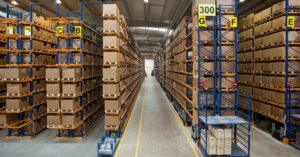With over 11 million cargo containers arriving at major U.S. seaports each year, congestion and delays are frequent due to the high volume of cargo. The pandemic’s economic impact has further exacerbated these issues, leading to a significant increase in blank sailings. As a result, containers often remain at the port longer than anticipated.
To manage port congestion, terminal operators and shipping lines impose demurrage fees. In this blog, we’ll explain what demurrage fees are and share Unilogic’s perspective on them.

What is a Demurrage Fee?
Demurrage is a fee charged when containers remain at a port or rail yard for longer than the authorized time. This price begins the day following the “Last Free Day” and is charged per container every day until it is picked up.
The amount of time allowed to pick up cargo varies based on the mode of transportation and the port or terminal. goods arriving by sea usually have four to seven days of free storage, although air and rail goods normally have 48 hours. Because laws vary by port and terminal, it’s critical to be informed of the individual demurrage restrictions along your container’s path to avoid unexpected fees.

Detention vs. Demurrage
Demurrage and detention are often confused, but they refer to different charges related to container handling.
- Demurrage: This fee is applied when a container is held at a port, rail terminal, or other handling facility beyond the designated free time. It covers the cost of storing containers while they are still at the terminal and waiting to be picked up or delivered.
- Detention: This charge applies when a container is held outside of a port or terminal—under the care of the customer—beyond the allowed free time. It covers the cost of keeping the container in the customer’s possession, such as at a warehouse or other location, before it is returned to the terminal.
Storage vs. Demurrage
After a container is unloaded from a ship and placed in the port’s Container Yard (CY), there is a free period to allow for customs clearance and delivery. If a container remains in the port owing to issues such as documents or payment, it will incur storage charges after the free time period has expired.
To manage excessive storage expenses, ports may occasionally relocate containers to private depots. In contrast, demurrage fees are directly imposed by the shipping line if the container is not cleared and returned to a designated empty depot within the allotted time.
Understanding the differences between these charges allows you to avoid unexpected fees and handle logistics more effectively.

Why Demurrage Fees Have Increased Recently
Since the pandemic, demurrage and detention charges have surged. According to Container-xChange, from 2020 to 2021, these charges increased by 104% for two-week periods at the top 20 global ports.
Several factors contribute to this rise:
- Increased Charges: Shipping companies are now charging higher fees to manage container availability and reduce delays at congested ports.
- Port Congestion: Delays in unloading ships, terminal congestion, and holdups with land couriers have become more common, leading to longer stays for containers at ports.
- Demand Surge: As pandemic restrictions eased, demand for imports and exports surged, further straining the supply chain and leading to increased demurrage fees.
- Labor Shortages: Quarantine and public health measures have caused labor shortages, slowing down container handling and customs processing. This has resulted in longer port stays and more demurrage charges.
These combined factors have led to higher demurrage fees as ports and shipping companies work to manage the increased demand and congestion.
How Unilogic Group Helps You Avoid Demurrage Fees
Unilogic Group helps you avoid demurrage fees by maintaining its own chassis pool. Here’s how this benefits you:
- Efficient Container Management: By using Unilogic’s dedicated chassis pool, containers can be quickly and efficiently moved in and out of ports. This reduces the time containers spend waiting, which helps prevent demurrage fees.

- Reduced Delays: With access to a reliable and readily available chassis fleet, Unilogic minimizes delays caused by chassis shortages or logistical issues. This means your containers spend less time at the port and are promptly picked up and delivered.
- Streamlined Operations: Unilogic’s in-house chassis pool allows for better control over the transportation process, ensuring that containers are managed smoothly and efficiently. This helps avoid the common pitfalls that lead to demurrage charges.
By leveraging its own chassis resources, Unilogic Group ensures that your cargo moves efficiently through the supply chain, helping you avoid unnecessary demurrage fees and keep your logistics running smoothly.

